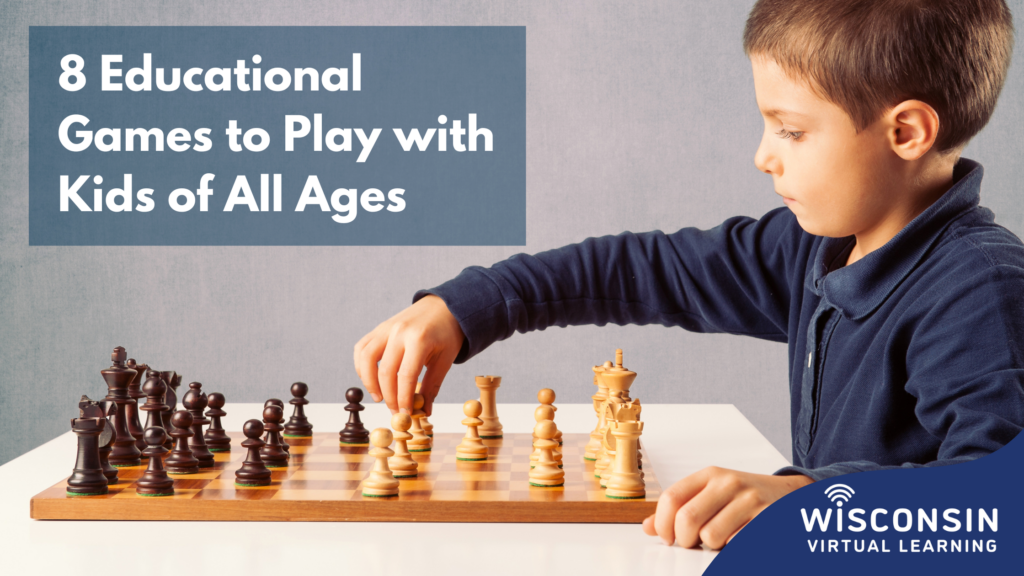Educational games can transform learning into an exciting adventure for children of any age. Whether your goal is to reinforce concepts from school or just sneak in a little extra learning at home, these games engage young minds while having fun. Below are eight engaging educational games for kids in four age groups: pre-K, elementary, middle, and high school. Each game is tailored to develop skills and knowledge appropriate for different developmental stages, helping children grow academically while enjoying themselves.
Pre-K Games (Ages 3-5)
- Shape and Color Scavenger Hunt: For pre-K children, learning shapes and colors is a crucial developmental milestone; turning it into a scavenger hunt adds an element of adventure. Encourage your child to find objects around the house that match a specific shape or color, such as, “Can you find something round and blue?” This game strengthens their ability to identify shapes and colors while fostering critical thinking and problem-solving skills in a fun, active way.
- Counting with Everyday Objects: Make counting a fun, interactive game using everyday objects like toys, snacks, or blocks. Have your student count aloud as they group the items together: “Can you give me five pieces of cereal?” This simple game helps them practice number recognition and basic math concepts, all while keeping the activity playful. By incorporating familiar objects, you ensure that counting is enjoyable and easy for young learners to grasp.
Elementary School Games (Ages 6-10)
- Math Bingo: Math can be exciting when presented as a classic game of Bingo with a twist. Create Bingo cards filled with math problems—addition, subtraction, multiplication, or even fractions, depending on your child’s grade level. Call out math problems, and have your learner solve them to mark their Bingo card. This game reinforces essential math skills, encourages quick thinking, and boosts confidence as they master different types of math operations.
- Storytelling Cards: Help elementary-aged kids unleash their creativity with a storytelling card game. Prepare a set of cards with different prompts, like characters (“a magical wizard”), locations (“an enchanted forest”), and actions (“rides a dragon”). Your child can draw a few cards and craft a story around these elements, building language skills and creativity while having fun. This game strengthens their storytelling abilities while enhancing vocabulary and sentence structure through playful interaction.
Middle School Games (Ages 11-13)
- History Trivia Challenge: Turn history lessons into a trivia game to keep middle schoolers engaged with their studies. Gather questions about significant events, famous figures, or cultural movements based on their school curriculum. Whether played individually or with friends, this educational game sharpens historical knowledge and encourages students to think critically about the past. Turning learning into a competitive or cooperative game makes history come alive.
- Periodic Table Battleship: Reimagine the traditional Battleship game with a science twist—this version uses the periodic table instead of coordinates. Players call out element names and symbols to “sink” their opponent’s ships, helping reinforce their understanding of chemistry. For example, calling out “Oxygen, second row, eighth column” instead of “A5” allows your child to familiarize themselves with the elements while enjoying a beloved game in a new, educational context.
High School Games (Ages 14-18)
- Debate Tournament: Developing critical thinking and argumentation skills is vital for high school students. Organize a home debate tournament with topics ranging from current events to ethical dilemmas. Participants can research their positions, structure their arguments, and defend them in a timed debate. This game fosters public speaking and research skills and encourages students to engage with complex topics and build confidence in articulating their ideas.
- Financial Literacy Simulation: Prepare your high schooler for the real world by simulating financial decision-making. Create a virtual budget where they must allocate funds for rent, groceries, savings, and unexpected expenses like car repairs. This educational game teaches practical budgeting skills and encourages students to think critically about how financial choices affect their future. By turning financial literacy into a simulation, students gain hands-on experience managing money while having fun with real-life scenarios.
Learning Through Educational Games at Any Age
No matter your child’s age, educational games are an excellent way to foster learning in a relaxed, enjoyable way. From developing foundational skills in preschoolers to preparing high schoolers for real-world challenges, these games keep students engaged while reinforcing academic concepts. Incorporating play into learning can help your child stay motivated, curious, and ready to take on new challenges.
Want to explore more ways to enhance your child’s learning experience? Visit Wisconsin Virtual Learning to discover additional resources and programs designed to support students of all ages.

